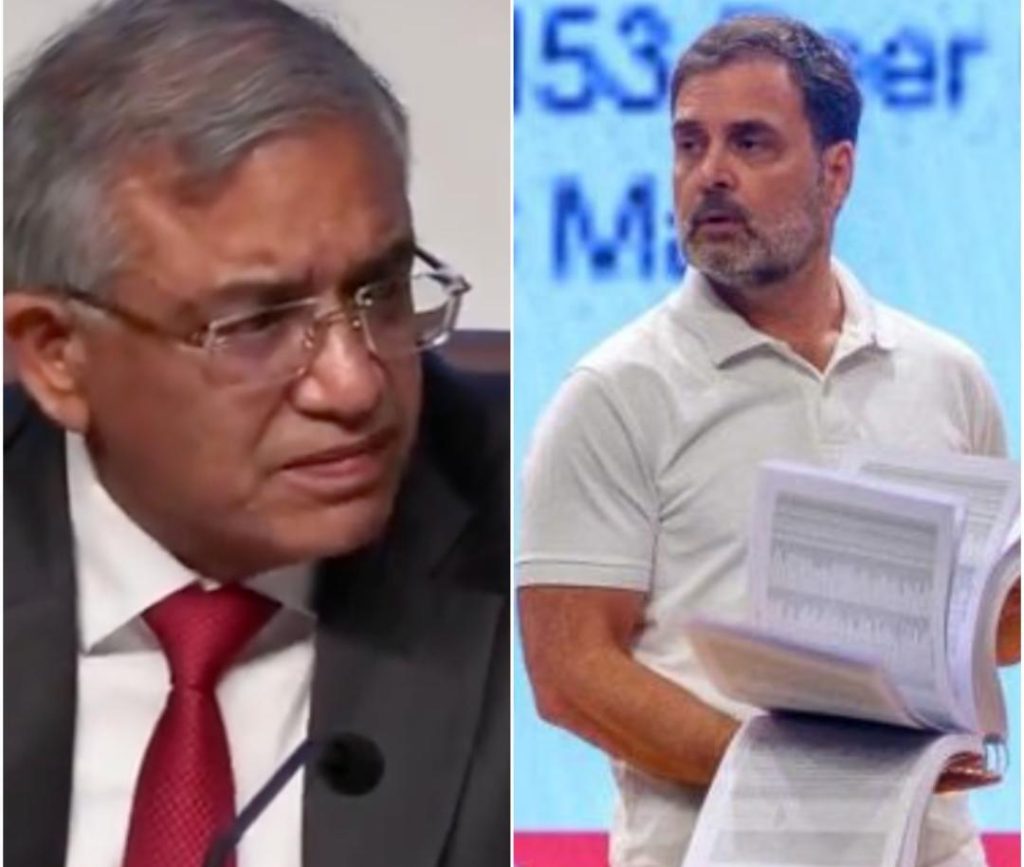
Vote Chori’ Phrase an Insult; Should We Share CCTV Footage of Mothers & Sisters Voting?: EC
In the midst of a heated political campaign, Election Commissioner Gyanesh Kumar has sparked a controversy by criticizing the term “vote chori” (voter fraud) and questioning the demand for releasing surveillance footage from polling booths. The phrase, used by Congress leader Rahul Gandhi to claim that elections are rigged, has been met with widespread criticism, with many labeling it an insult to the Constitution.
The controversy surrounding the “vote chori” phrase has raised several questions about the sanctity of the electoral process and the role of the Election Commission in ensuring free and fair polls. Furthermore, the demand for releasing CCTV footage from polling booths has sparked concerns about voter privacy and the potential for misuse of sensitive information.
In an interview, Kumar slammed the “vote chori” phrase, stating that it was not only an insult to the Constitution but also undermined the faith of citizens in the electoral process. He emphasized that the Election Commission was committed to ensuring the integrity of the polls and would take all necessary measures to prevent any form of voter fraud.
However, Kumar also expressed concerns about the demand for releasing CCTV footage from polling booths, citing voter privacy concerns. He asked, “Should the Election Commission share the CCTV videos of any voter, including their mothers, daughters-in-law?” Kumar’s remarks have sparked a heated debate, with many arguing that releasing CCTV footage would help to increase transparency and accountability in the electoral process.
Others have countered that releasing CCTV footage would compromise the privacy of voters, potentially leading to harassment and intimidation. They argue that the Election Commission should focus on ensuring the security and integrity of the polls, rather than releasing sensitive information that could be misused.
The controversy surrounding the “vote chori” phrase and the demand for releasing CCTV footage from polling booths is not new. In recent years, there have been several instances of political parties and leaders making similar allegations of voter fraud, often without providing concrete evidence to support their claims.
In 2019, the Election Commission had to intervene after several political parties, including the BJP and the Congress, made allegations of voter fraud and election rigging. The Commission had to issue several statements to clear the air, emphasizing that the polls were conducted in a free and fair manner and that any allegations of voter fraud were baseless.
The “vote chori” phrase and the demand for releasing CCTV footage from polling booths have also sparked concerns about the role of social media in shaping public opinion. In recent years, social media platforms have become a major battleground for political parties, with many using social media to spread misinformation and propaganda.
In the aftermath of the 2019 general elections, several studies had highlighted the role of social media in spreading false information and propaganda. The studies had shown that social media platforms were used to spread fake news and misinformation, often with the aim of influencing public opinion and shaping the outcome of the elections.
In conclusion, the controversy surrounding the “vote chori” phrase and the demand for releasing CCTV footage from polling booths is a complex issue that raises several questions about the sanctity of the electoral process and the role of the Election Commission in ensuring free and fair polls. While Kumar’s remarks have sparked a heated debate, they also highlight the importance of ensuring the privacy and security of voters, as well as the need for political parties and leaders to refrain from making baseless allegations of voter fraud.
As the country prepares for the upcoming elections, it is essential that the Election Commission and political parties work together to ensure that the polls are conducted in a free and fair manner. This can be achieved by emphasizing the importance of voter privacy and security, as well as promoting transparency and accountability in the electoral process.






